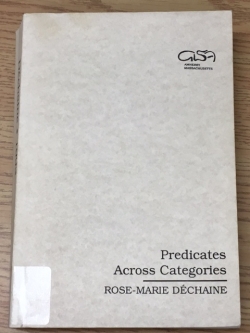Predicates across categories : towards a category-neutral syntax

Book Stores
Type
Book
Authors
Category
Publication Year
1993
Publisher
Graduate Linguistic Student Association, United States
Pages
548
Tags
Abstract
According to an Aristotelian view maintained in modern linguistics, a sentence consists of a predicate, a subject and some indication of tense. This work attempts a principled and coherent account of the Aristotelian sentence, in the framework of modular generative grammar (Chomsky 1981). From the starting point that predication is a licensing relation--the $\Pi$-relation--a category-neutral theory of predication becomes possible. This in turn has consequences for two domains of grammar: 'inside' the predicate, and 'outside' of it.^ Part I is concerned with the inside of the predicate. A category-neutral theory of predication has consequences for category features, for the representation of language-particular categorial inventories and for the role of selection and adjunction in phrase structure. A detailed case study compares the phrase structure of English and Standard Yoruba. The category-neutral framework employs bivalent Lexical projections in the analysis of English adjunct predicates, coordinate structures and triadic predicates, as well as serial verb constructions (Chinese, Igbo, Yoruba, Haitian) and consecutive constructions (Korean and Japanese), and develops a set of principles of event composition therein.^ Part II is concerned with the outside of the predicate, in particular tense-marking. The notion that copulas are inserted to turn non-verbs into predicates is critiqued. As an alternative, language-particular restrictions on tense-marking, default agreement and the distribution of copulas, aspect and negation are reduced to categorial selection. A detailed analysis is given of Standard American English tense-marking, followed by case studies of African American English, Modern Hebrew and Haitian. The device of homophonous grammatical morphemes is rejected as a matter of principle and on empirical grounds. The study closes by examining the role of default agreement in inflection and auxiliary placement in Igbo and Yoruba.^ An appendix gives a metrical account of Igbo tonal syntax. Other languages discussed include Modern Standard Arabic, Standard British English, Child English and Russian. ^
Description
Contents
1. Introduction / Violeta Demonte and Louise McNally -- Part I: Foundational aspects of event structure: telicity, change, and state -- 2. Lexical aspect and multiple incremental themes / John Beavers -- 3. Another look at accomplishments and incrementality / Susan Rothstein -- 4. The composition of incremental change / Christopher Kennedy -- 5. Telicity expression in the visual modality / Evie Malaia and Ronnie B. Wilbur -- Part II. Event structure in a cross-categorial perspective -- 6. The monotonicty hypothesis / Andrew Koontz-Garboden -- 7. From psych verbs to nouns / Antonio Fábregas, Rafael Marín, and Louise McNally -- 8. Passive states / Berit Gehrke -- 9. The syntax and semantics of inchoatives as directed motion: the case of Korean / Dongsik Lim and María Luisa Zubizarreta -- 10. Conflation and incorporation processes in resultative constructions / Jaume Mateu -- 11. Parameter theory and motion predicates / William Snyder -- 12. Building involuntary states in Slavic / María Luisa Rivero and Ana Arregui.
1. Introduction / Violeta Demonte and Louise McNally -- Part I: Foundational aspects of event structure: telicity, change, and state -- 2. Lexical aspect and multiple incremental themes / John Beavers -- 3. Another look at accomplishments and incrementality / Susan Rothstein -- 4. The composition of incremental change / Christopher Kennedy -- 5. Telicity expression in the visual modality / Evie Malaia and Ronnie B. Wilbur -- Part II. Event structure in a cross-categorial perspective -- 6. The monotonicty hypothesis / Andrew Koontz-Garboden -- 7. From psych verbs to nouns / Antonio Fábregas, Rafael Marín, and Louise McNally -- 8. Passive states / Berit Gehrke -- 9. The syntax and semantics of inchoatives as directed motion: the case of Korean / Dongsik Lim and María Luisa Zubizarreta -- 10. Conflation and incorporation processes in resultative constructions / Jaume Mateu -- 11. Parameter theory and motion predicates / William Snyder -- 12. Building involuntary states in Slavic / María Luisa Rivero and Ana Arregui.
Number of Copies
1
| Library | Accession No | Call No | Copy No | Edition | Location | Availability |
|---|---|---|---|---|---|---|
| Centrale | 495 | P 291 D | 1 | Yes |




